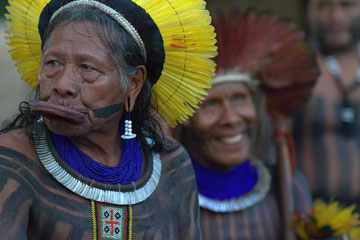Leaders of more than two dozen Kayapó indigenous communities have rejected a $9 million offer from Brazilian state energy company Eletrobras to fund development projects in their region due to the the firm’s involvement in the construction of the Belo Monte dam, reports Amazon Watch, an activist group fighting the hydroelectric project.
Eletrobras had offered the money over a four year period, during which it is planning to proceed with the dam, which will redirect the flow of 80 percent of the Xingu river, which Kayapó and other indigenous communities depend upon for fishing. Belo Monte, which will operate at less than 40 percent of capacity despite its $15 billion dollar price tag, will require additional upstream dams to be commercially viable, according to independent analysts. These dams would more directly affect the Kayapó, the majority of whom live 500 km upstream of the Belo Monte dam site.
Accordingly, during a meeting last week in the town of Tucuma the Kayapó leaders unanimously rejected the funding proposal and vowed to fight the dam.
 Chief Raoni of the Kayapoi has spent 30 years fighting the Xingu River. Photo courtesy of Amazon Watch. |
“We have decided that your word is worth nothing. The conversation is over,” wrote the Kayapó in a letter to Eletrobras. “We, the Mebengôre Kayapó people have decided that we do not want a single penny of your dirty money. We do not accept Belo Monte or any other dam on the Xingu.”
“Our river does not have a price, our fish that we eat does not have a price, and the happiness of our grandchildren does not have a price. We will never stop fighting: In Altamira, in Brasilia, or in the Supreme Court. The Xingu is our home and you are not welcome here.”
The Kayapó also sent a letter to Joaquim Barbosa, the President of Brazil’s Supreme Court, demanding action against the dam.
Not all the Kayapó have rejected funds from Eletrobras. Amazon Watch says that about a quarter of the Kayapó — specifically communities from the northwest of Kayapó lands — have accepted funds from the energy giant.
There are around 7,000 Kayapó left in Brazil.

Three hundred indigenous people, small farmers, fisherfolk, and local residents occupied the Belo Monte Dam project, removing a strip of earth to restore the Xingu’s natural flow and “freeing the river.” Participants gathered in formation spelling out the words “Pare Belo Monte” meaning “Stop Belo Monte” to send a powerful message about the devastating impacts of the dam on the eve of the UN Rio+20 Summit. Their message is that projects that destroys livelihoods and the environment and that violate indigenous rights cannot be called “Clean Energy”. They are demanding the cancellation of the $18 billion Belo Monte dam project. Caption courtesy of Amazon Watch. Photo credit: Atossa Soltani/ Amazon Watch / Spectral Q
Related articles
Dams are rapidly damning the Amazon
(12/08/2012) Dam-builders seeking to unlock the hydroelectric potential of the Amazon are putting the world’s mightiest river and rainforest at risk, suggests a new assessment that charts the rapid expansion of dams in the region.
Brazilian bank approves $10.8 billion loan for controversial Amazon rainforest dam
(11/30/2012) Brazil’s National Development Bank (BNDES) on Monday announced it has approved a $10.8 billion (22.5 billion Brazilian reais) loan to the consortium that is building the controversial Belo Monte dam in the state of Par´ in the heart of the Amazon rainforest, reports International Rivers, a group that is campaigning against the dam. The loan in the largest in the bank’s 60-year history, according to the group.
Indigenous groups re-occupy Belo Monte dam in the Amazon
(10/09/2012) Construction on Brazil’s megadam, Belo Monte, has been halted again as around 150 demonstrators, most of them from nearby indigenous tribes, have occupied the main construction site at Pimental. Over a hundred indigenous people joined local fishermen who had been protesting the dam for 24 days straight. Indigenous people and local fishermen say the dam will devastate the Xingu River, upending their way of life.
Dams are ‘centerpiece of greenwashing’ in the Amazon
(06/25/2012) Brazil’s ambitious plans to build 30 dams in the Amazon basin could trump the country’s efforts to protect the world’s largest rainforest, said a leading Amazon scientist speaking at the annual meeting of the Association for Tropical Biology and Conservation (ATBC) in Bonito, Brazil.
Protesters dig canal through Belo Monte dam in Brazil (Photos)
(06/16/2012) In an symbolic protest of the giant Belo Monte Dam, Friday morning some 300 locals dug a channel in an earthen dam that blocks a portion of the Xingu River and serves as the first step of the controversial hydroelectric project, reports Amazon Watch.
Will mega-dams destroy the Amazon?

(04/18/2012) More than 150 new dams planned across the Amazon basin could significantly disrupt the ecological connectivity of the Amazon River to the Andes with substantial impacts for fish populations, nutrient cycling, and the health of Earth’s largest rainforest, warns a comprehensive study published in the journal PLoS ONE. Scouring public data and submitting information requests to governments, researchers Matt Finer of Save America’s Forests and Clinton Jenkins of North Carolina State University documented plans for new dams in Bolivia, Brazil, Colombia, Ecuador, and Peru.







